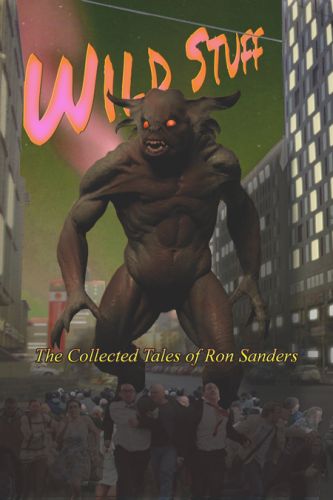MoreA Story by Ron SandersBe careful where you dig. You dig?
More
Photosynthesis is a beautiful thing. Symbiosis is another. When these two natural processes are contemporaneous--that is, when they develop in sync--the organic and inorganic are bridged, becoming, in effect, a single collaborative force. And on little MW-9 this beautiful marriage resulted in that rarest of planetary phenomena, the sympathetic bridge. The tiny planet itself isn’t exactly alive, of course, at least not in the sense we appreciate life back home. But it can respond to its ecosystem, is capable of a crude vivacity when stimulated, and shows every indication of being sentimentally attached to the funky lichenous algae and brackish mauve gazillipedes it eats and eliminates on a perpetual basis. It can spontaneously rearrange its gooey omnipresent fungal matter into grasping appendages and absorbent fields, and exude a sticky mucus-like substance for breaking down proteins. The planet can appreciate and adapt--at the very basest of levels, and, like any source of awareness, once prodded must grow. For time out of mind MW-9’s perception, lacking any other stimuli, plodded along in tandem with its slimy inhabitants, categorizing only patterns and portions. But when the first Earth prospectors came hacking into the planet’s ore-rich dermis, MW-9 was treated to not only a luscious banquet of exotic plump tissues, savory fat deposits, and tender basal ganglia--but to an ever-broadening feast of fresh thoughts and feelings.
That original party of eleven dissolved only moderately well--the prospectors, much bulkier than MW-9’s steady diet of bugs and regenerated slime, had to be assimilated molecule by molecule...so those prospectors died very, very slowly--standing gummed to the drilled-out walls for days, some for a week and more, while their diminishing screams sang through the main tunnel and half-completed shafts. In fact, so ponderous is the dissolution of, say, a two hundred pound Earthling, that the majority were still pasted there less than fifty percent absorbed, the smashed organs of each glaringly preserved by the planet’s natural secretions, when the investigative crew arrived six months later. More important: MW-9, in its primitive way, had been studying various aspects of higher sentience--frustration, homesickness, competitiveness, camaraderie--during the initial months of setup and shaft-digging. Talk and laughter, shouted orders--the vibrations bounced along the main tunnel’s walls, teasing and titillating. Even brain waves, on a world so achingly sluggish, were decipherable at the crudest telepathic level, first solely in conjunction with actions, later as entirely predictable systemic events. But the real breakthrough came when the men were slapped against the main tunnel’s walls and the actual sucking, crushing, and shredding began: physical contact, nervous tension, writhing agony--all this was very conducive to MW-9’s learning process. Then, upon commencement of the living prospectors’ gradual absorption, MW-9 started sampling ideas, dreams, and memories. This was a sympathetic thrill of almost erotic import. MW-9 accumulated the spectra of human intuitiveness by degrees; puzzling over selfishness, lust, and greed, pondering on loyalty, faith, and love. MW-9 was self-educating, and fast, but there was an unforeseeable speed bump: the prospectors’ growing delirium resulted in disjointed thought patterns, in hours of unproductive raving, and in thoroughly distracting spells of mindless shrieking, spewing, and weeping. The planet sucked harder, ravenous for more, while the prospectors, approaching death, simultaneously lost all capacity to generate the good stuff. It became a matter of managing their murders: of sucking them down, but not sucking them dry, of backing off, but not too far. With enough practice, the little planet was able to clench-and-release in a kind of respiratory maneuver, squeezing the prospectors into the rock just to the point of hemorrhage, then relaxing and transferring needed sustenance into their wracked mouths via the traction-smashed remains of nuzzling insects and protein-rich slime. Revelations came fast-and-furious. When the prospectors’ initial terror and desperation gave way to mindless horror, MW-9 found the experience so exquisite it started playing the men like exotic instruments; bending and tweaking, measuring pitch and amplitude--trying to get the broadest variation from each bottomless shriek. Eventually a pain threshold was reached, and the men began calling out directions and suggestions. MW-9 was able to match words with actions, and, cross-referencing those words and actions with thoughts and memories, rapidly learn of motive and rebuttal, command and rebellion, resistance and surrender. Inevitably came death. First to go was the most vociferous: that thin, indefatigable screamer with the retching heaves, the bursting sores, and a tendency to profound bleeding. Next went the fat one; shaking spasmodically, sweating massively into the slime, crying out to relatives and deities unseen...then another and another--MW-9 found itself fast losing its learning source to an invisible and incomprehensible interloper; a force far deeper than physical pain and emotional suffering. Puzzling, too, was the prospectors’ odd embrace of this final darkness over lingering horror--prior to acceptance and submission it had all been about survival at any cost, as though life, wretched life, held an indescribable significance. The planet felt cheated, having acquired the hallowed taste just as the cup went dry. And so it learned the frustration of kicking a dead horse, and, ultimately, blind and insupportable rage, as it continued to uselessly squeeze and release, prod and peel, squeeze and release--starving for understanding...and always demanding more.
Captain Tulman was first through the airlock. Having picked up no signs of life on the dinghy’s computer, he expected something grim. But the scene in that tunnel was so revolting he immediately threw out a restraining arm. The investigative crew of three craned to see. All eleven prospectors stood spread-eagled against the tunnel walls, the shreds of their vital organs gleaming. Green spittle-like foam clung to the carcasses, catching the airlock’s artificial light. Halfway down the main tunnel, to the crew’s right upon entering, squatted a dull-white plexiglass-and-steel dome serving as galley, rec room, and barracks. The foamy slime appeared dependent on the rock itself, for the dome was untouched, as well as the six feet of stainless steel bore on the airlock’s tunnel side. A gentle dirt incline led from this bore’s lip into the tunnel proper. Tulman ran his fingertips over the airlock’s exterior panel. The site’s lights began to glow, and a bellows was triggered behind the dome. When the tunnel was breathable the crew removed their suits. Tulman closed the inner lock and the men professionally moved to their jobs. In a minute site analyst Cobbe showed Tulman a slide containing a fresh veneer sample. “This is living matter, Captain, similar to the stuff on the surface. It’s not independent of the rocks or adjoining slime colonies, or, for that matter, what’s left of Mr. Erenson here. We can consider this entire scene as analogous to an imperceptibly slow digestive system.” “And Erenson?” “A food source.” He tossed his head at the facing lines of bodies. “One of several.” As Tulman leaned in for a closer look the veneer appeared to withdraw ever so slightly. “So this slime is devouring the cadavers; breaking them down for nutrition.” “Yes and no.” Cobbe tweaked his reader. “This material is acting as a go-between for these dissolving bodies and something else.” “Odd.” Tulman laid his hand on a crewman’s shoulder. “Selner, I want you to itemize everything in that dome. Iven, I’d like you to scan the insides so we can match your data with Cobbe’s. We’re looking for a bridge between the slime and a modifier. Cobbe, come with me.” They strolled down the tunnel, pausing at each cadaver for a sample and dialogue. Tulman was taken by an ineffable sense of tension in the place. “I have this feeling, Cobbe, of another presence. I’m not asking for a physical read. What are your impressions?” Cobbe inhaled deeply. “Very spooky. Cold, dark, and quiet. Sepulchral. I’d say your reactions are perfectly healthy. I get the same heebies, and I’m guessing Iven and Selner aren’t exactly yukking it up. Right now I’m probably the wrong guy to recommend you just relax.” They walked on. The tunnel narrowed in direct relation to the increasing paucity of ore deposits, at the same time growing darker due to fewer strung lights. When they stopped the creepiness weighed a ton. Tulman and Cobbe shared the strangest anxiety--as though they were being observed at many levels; from all around, from up close, from on high--with a burning curiosity and barely-contained want. They turned about slowly, their boots ringing against the rock. At last Tulman muttered, “We’re not alone in here, Cobbe.” “Just us dancing with our shadows, Captain.” “Run a scan anyway.” Cobbe’s fingertips played over a screen. “Life readings are restricted to our party and this slime.” He paused. “However.” “Go on.” “There are sentience readings unrelated to we four.” “How so?” “Something else is alert here, Captain. That’s all I can tell you.” Tulman’s eyes retraced their steps. “There are eleven prospectors, all accounted for, all stuck to the walls.” “They’re very dead, Captain.” “Apparently not.” They walked back to the nearest. Richard Templeton, plastered into the rock and almost entirely coated in slime, was an unlikely candidate for Cobbe’s reading. His muscles were eaten away, right down to the bone. Orbits and nasal passages were gaping, the mouth chock full of dormant ooze. Cobbe scanned him left and right, ran a probe down the throat, rapped on the caved chest. “No, Captain.” They proceeded back up the tunnel, carefully studying the remaining ten. “Absolutely nothing,” was Cobbe’s conclusion. “Okay.” Tulman called out Iven and Selner. “I want you guys to extract and preserve what’s left of these bodies. Cobbe’s going to cull the necessary reads and samples. Whatever’s going on here, it’s not safe for further prospecting. I’m ordering a complete shutdown of operations. Once we’ve disassembled the dome and packed all the contents we’re going to burn this place out.” There was an immediate change in the tunnel’s ambiance. Everybody felt it. It was weird, as though all their shadows had shifted without any corresponding movements from the men. Selner was first to speak. “Did you guys pick up on that?” “Something else...” Cobbe mumbled, “is in here.” Tulman nodded and motioned for silence. The men stood absolutely still. It was very cool in the tunnel. New air humped and sighed with the bellows, the strung lights rocked gently with its breath. The men all became aware of a soft bubbling in the veneer. Tulman locked stares with Iven and gestured repeatedly with his eyes, indicating the dome. All around them, the slime began roiling and jutting, quickly pleating into taffy-like strands. Iven nodded. The moment his boot left the ground a tendril shot out and latched onto his ankle. The ceiling and walls became violently alive. Limbs formed out of humps and slapped about furiously, bulbous projections heaved, drooped, and rolled to the tunnel floor. Iven didn’t have a prayer. A tentacle-like appendage clamped around his throat and slammed back his head. He snarled at the pain of traction, then, as the ooze on his scalp shrank back into the rock, threw open his mouth and screamed. “Iven!” Tulman called. “Work with us!” But the harder they tugged, the harder the tentacle resisted. Slime raced up Iven’s legs and attached to squirming buds on the wall. Under the mounting haul of several g force units, he blew out a wild shriek that just went on and on until his coiling tongue compressed. Iven’s palate cracked and his eyeballs imploded. Fat strands swung down from the tunnel’s roof, slapped onto forearms, caught in hair and clothes. The men ran for the dome, dodging whipping tendrils all the way. Selner threw open the hatch even as the first bolts came smacking along the sides. Goo plopped onto the roof, showing as deep gray blotches against the artificial light. The men caught their breaths and huddled. “The room is being sealed,” Cobbe panted. He ran his fingers over the main board’s sensors. “Ventilation is confined to outside. The dome won’t be able to respire with the tunnel. We’ll suffocate.” Tulman nodded. “Everybody head for the airlock.” Just overhead, the slime immediately shifted. Tulman said, “Stop!” He held out his hands and slowly rose to his full height. After a minute he enunciated, “Forget the airlock, men. We’ll get out the back hatch.” The uneven silhouette seemed to bunch before rolling toward the dome’s emergency exit. Tulman dropped to his haunches. “An eavesdropper!” The investigators crouched around him. “This living matter,” Cobbe observed, “is highly sentient. We now have an answer for those reads. It’s hearing and comprehending.” “Impossible,” Selner whispered. “We’re speaking a sophisticated language. Sentience notwithstanding, the broad complexity of English can’t be taught on the spot.” Tulman rose again. “Those men out there all spoke English. It was the going language. That green puke, you guys, or whatever’s pulling the strings around here, has had eleven tutors-in-residence for over half a year.” Cobbe took a swiveling chair and mused left and right. “Well, I’ll be. A fully aware, self-educating system, feeding on the thoughts of its victims even as it absorbs them.” “And it’s all over Iven,” Tulman said. “And it knows our rationale. And it hears us.” His expression was sour. “Without ears?” Fully one third of Selner’s resume was devoted to acoustics. “Probably via the dome’s skin, which is acting as a tympanic membrane.” Cobbe leaned in and lowered his voice. “It’s sensitive to our movements, too. You saw how it reacted when we took off.” “Then we’re candy in a jar.” Tulman began to pace, watching the overhead silhouette match his progress. He paused and cocked his head. “But it’s ignorant! How can slime know things intuitively?” Cobbe dreamily wagged his head. “Not the slime, Captain. We have an unseen host, whoever or whatever it may be. As to ‘hearing’ us, well, a rude form of telepathy is a reasonable guess. After all, what’s thought but unspoken speech?” He rocked his chin on his folded hands. “We’re glued, we’re screwed, we’re food.” In a minute he smiled and looked back up. “Ig-pay atin-Lay.” The two stared. Finally Selner said: “Ou-yay ean-may?” Tulman showed a raised thumb. “Es-yay! A foreign tongue.” He tapped a forefinger on his skull. “Ink-thay ame-say.” Speaking in pig Latin, he instructed the men to make a running escape out the front hatch. Selner and Cobbe nodded, took deep breaths, and tensed. “On-ay,” Tulman said, “ee-thray,” and raised his voice to the ceiling. “Okay, men. We’ll make a dash for the rear hatch, on the count of three. One...” the silhouette rolled across the roof, “two...” slabs and limbs streamed up the sides and joined the rearward flow, “...three!” The men blew out the front hatch and raced for the airlock. The ruse was only good for a few seconds--before they’d run ten yards the tendrils were on them. Selner was caught first; grabbed around the waist and dragged halfway up the tunnel wall. Cobbe was clamped at the scalp and shoulders, Tulman struck around the lower chest. The captain kept going. The little planet’s low-grav pull, along with his natural athleticism, allowed Tulman to capitalize on that momentum--to leap off the floor’s incline, to perform a complete upside-down kick in the air, and to crush the grappling lash with his boot while simultaneously pushing himself onto the airlock’s steel outer lip. He turned on his hands and knees in time to see Cobbe pinned like a starfish against the wall. MW-9 was rapt: This is what the six-month buildup was all about...loyalty in the presence of fear--powerful emotions put to the test. Tulman grabbed Cobbe’s jerking hand. There was just enough opposing force to make him tug harder. Tulman ran his forearm under one of the airlock’s handholds and hauled with all his might. The truth hit him like a fist, and in that instant Tulman became oddly empathic. One moment he was fighting the natural resistance of a living substance, the next he was caught in a childish tug-of-war with something beyond the senses. Percolating ooze worked its way around Cobbe’s eyes. “Please...” The analyst’s head was drawn back until his Adam’s apple protruded. The flesh at his mouth tore away, and his whole face began stretching back into the rock. Tulman threw all his weight into his right shoulder while the tendrils slapped and slid off the smooth steel casing. The limb around Cobbe’s throat unraveled and immediately latched onto the captain’s wrist. Tulman pushed off. Using his momentum, he was able to twist around and trigger the airlock’s inner door with his free hand. In the sudden blast of light the tunnel became a surreal, nauseating horror: a rotting intestinal tract, an infested sewer full of writhing tentacles and rearing spume. Cobbe and Selner were being torn into the rock, their contorted, slime-coated faces glistening green against the shadows. And a black presence swooped up from the tunnel’s bowel, ever so slightly dimming the swinging lights. It hovered before Tulman with a bitterness too deep to fathom. The captain stood mesmerized. Finally he muttered, “And f**k you.” He stepped into his suit. When it was fully pressurized he activated the belt’s electromagnet. Tulman was instantly slammed against the curved steel wall. He grabbed a handhold, said, “Goodbye, Cobbe,” and triggered the outer airlock. The explosion of escaping air almost separated his shoulder. Bits and pieces of the tunnel’s innards--tendrils, lights, miscellaneous body parts--were sucked out in a great wheezing rush. Tulman waited for the gale to pass before deactivating the magnet. He slowly drifted out into space. The blast had disrupted the airlock’s internal lighting; unlit, the tunnel was a dead follicle. Tendrils waved languidly, crystallizing as he stared, breaking off in chunks that disintegrated on impact. A vacillating shadow rose to the airlock’s rim, throbbing in perfect time with the captain’s pulse. It took a minute for Tulman to realize he was being channeled. He released a distress flare and allowed it to drift. In the bright white halo the shadow quickly waxed opaque. Tulman hung in the sentient field like a fly in a web. We’ll return, he thought, and when we do we’ll blow you clean back to the planetesimal stage. If you can feel anger, you can feel fear. You think you understand rage? Reach deep into my mind--read the memories of my species. See what we’ve done to our own kind, all in the name of whatever cause was most convenient, and then just know we’ll be back. He signaled the dinghy and watched as the buoy redirected. So until that hour, you just make damned sure you remember the name Human. Once the hull had identified his signature, Tulman punched out a sequence that engaged the rockets. He tweaked his pad. The dinghy came up gently, looking like it was moving in slow motion. Tulman guided it perpendicular to the field so that its rockets were burning quietly just above the airlock. It was a near fit; the dinghy could have descended into the tunnel without scraping its sides. The captain fired all rockets, producing a dazzling, silent, all-eradicating storm, and thought fiercely: Now dwell on that!
Don’t miss my collection of poems
Out Of The Whirl available on Amazon at:
Out Of The Whirl: Sanders, Ron: 9798671245547: Amazon.com: Books
My stories collection Wild Stuff is also available on Amazon, at:
Along with Storyteller, all my novels in one volume, at:
(copy and paste) https://www.amazon.com/gp/product/B09JMWC7WQ/ref=x_gr_w_bb_glide_sout?ie=UTF8&tag=x_gr_w_bb_glide_sout-20&linkCode=as2&camp=1789&creative=9325&creativeASIN=B09JMWC7WQ&SubscriptionId=1MGPYB6YW3HWK55XCGG2
talk to me at: [email protected] © 2021 Ron SandersAuthor's Note
|
StatsAuthorRon SandersMarina del Rey, CAAboutL.A.-based novelist, illustrator, poet, short story writer. more..Writing
|





 Flag Writing
Flag Writing